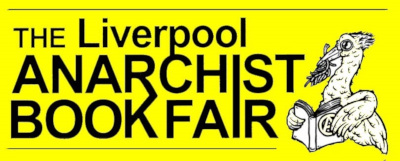Our transgender solidarity statement
It is more important than ever to stand in solidarity with trans people against attacks on their rights, existence & healthcare, against the transphobic hatred, fearmongering, misinformation & eliminationist rhetoric of politicians, the media, & anti-trans activists.
The Liverpool Anarchist Bookfair collective wants to be clear that our aim is for our event to be trans-inclusive (this is a priority for us) and transphobia won't be tolerated. We also would ask that people be mindful when raising issues if they arise that it is unfair to put the responsibility for challenging transphobia or other forms of oppression on those it most affects, rather we ask people to challenge oppression yourself with the comrades around you where appropriate, or approach the organisers via the welcome desk, and we will deal with any concerns as best we can.
Trans people should be able to live freely and safely as themselves, and should be able to access the support and healthcare that they need. The struggles for trans peoples rights and for womens rights are inter-connected - all women including trans women are oppressed by systems of patriarchy, sexism, and gendered violence. Trans women are women, trans men are men, and non-binary people exist and should be acknowledged
What do we mean by transphobia?
The following kinds of things are not welcome at our event – note that this is not intended to be an exhaustive list: derogatory or offensive language about trans people; misgendering trans people and insisting that trans people should be identified as the gender assigned to them at birth; arguing for segregation of trans people or restriction of their rights; representing the presence of trans people as risky or dangerous, and other fear-mongering arguments; representing being trans as something negative; misrepresenting being trans as merely belief or conformity to gender stereotypes; objectifying or intrusively speculating about trans people's bodies, and policing or criticising their appearance (these things should obviously be not ok to do about anyone's body or appearance).
What are the facts about legal gender recognition and trans people’s rights?
Anti-trans campaigning in the UK often focuses on opposing gender recognition reform, and misrepresents what this involves. Here are the facts:
There are calls to reform the Gender Recognition Act 2004 to make the process of getting a gender recognition certificate (GRC) simpler and more accessible. A GRC enables a trans person to change the gender shown on their birth certificate, a limited but important legal change that helps protect them from being forced to out themselves as trans when dealing with officialdom. The current GRC process is extremely costly, time-consuming and intrusive. The proposed new process would involve making a legally binding declaration, like the system that has been used in Ireland since 2015, and similar systems introduced previously by Argentina, Denmark and Malta, and adopted by several other countries since. Self-declaration has not caused any problems in those countries. Trans people can change the gender markers on other documentation like passports and driving licences on a self-declaration basis already.
Trans people’s rights to access gender-specific facilities and services have long been protected by the Equality Act 2010, and these rights do not require a GRC, nor any medical diagnosis or treatment, as the law views being transgender as a personal process of moving away from the gender assigned at birth. Generally it has been the practice to accommodate trans women as women and trans men as men within most services and spaces for many years. A GRC is not necessary for a trans person to be accepted as and treated as their gender. It is in fact not lawful to require to see a person’s GRC.

